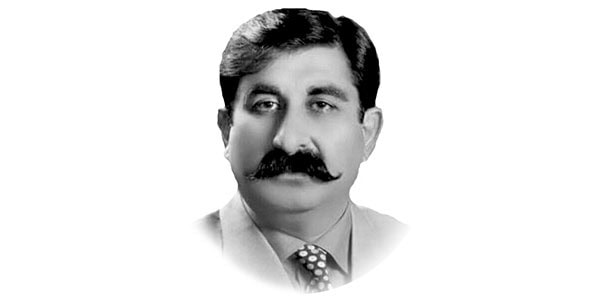Speedy justice and the lawyers
THE courts were locked.Protests spread.Honourable judges were harassed and indecent slogans chanted against them.
Decisions about speedy justice were denied and delayed and writ of the State was challenged.
All this was done with pride by the so-called custodians of law – the lawyers of Lahore Bar Association the other day.
In the entire Punjab province, civil cases are dealt in the courts set up in the relevant territorial jurisdictions but unlike other tehseels of the province civil cases were being dealt out of the territorial jurisdictions of the residents of different tehseels in centre of the city not in the relevant tehseels of Lahore district.
To provide speedy justice to the residents of different tehseels of Lahore the honourable Chief Justice Lahore High Court Justice Muhammad Ameer Bhatti decided to decenterlise the civil cases of different tehseels of Lahore and dispense them to the courts of the territorial jurisdiction but the advocates of Lahore Bar Association created law and order situation in the city, refused to accept this decision of the honourable Chief Justice LHC and created mess.
Resultantly, the same administrative decision was withdrawn by the competent authority.Is this the true rule of law and writ of the State?Not too far when in the same Lahore the provincial capital TLP bent the State to its knees.
Now the State is being run by the mobs.It is being done in the heart of Pakistan not in the remote bordering areas.
Do the lawyers honestly work to minimize miseries of the deserted masses? Should the people not be provided speedy justice on their door steps?
The Judiciary decided to provide speedy justice to the masses in their territorial jurisdictions but writ of the State was challenged by the advocates of Lahore Bar Association.
It was also demanded by the lawyers that they can’t be tried against 7-ATA.No one is above the law.
Any one who commits crime should be held and tried under relevant sections of the law.In such a situation, RAW can use such a sick mentality against the State.
Isn’t it?On the other hand, contempt of court is applied if honourable judges of the higher courts are disgraced but the same contempt is not applicable on the disgrace of the judges of the lower courts.Why?Is not a judge of the lower court a judge?
According to the constitution a Judge is judge without any discrimination of the higher or lower courts.
The right to a fair and speedy trial should be provided to the grieved as a fundamental right under the Constitution of Pakistan and by the lawyers.
Interpreting the right to a fair trial, the Supreme Court has held that the intention of the legislature is to give it the same meaning as is universally recognised and embedded in jurisprudence in Pakistan.
Courts in Pakistan have warned that speedy trial should never be at the cost of the procedure.
The right to be tried without undue delay means that the trial must be held within a reasonable time, encapsulating the globally recognised idiom “justice delayed is justice denied”.
This speed is achieved not through the strengthening of the justice system.
What is reasonable has to be assessed in the circumstances of each case, taking into account mainly the complexity of the case, and the conduct of the accused and the authorities.
A fundamental prerequisite of a fair trial, acknowledged in Pakistani law.Simply one law for all.The most misunderstood legal concept in Pakistan is that of speedy justice: from an essential safeguard for the accused, it has become a pretext to deny basic fair trial guarantee.
Courts in Pakistan have reinforced that a speedy trial is the inalienable right of every accused.
And they have warned that speedy trial should never be at the cost of the procedure or other rights one is entitled to, as the ultimate object of the criminal justice system is to administer justice, and not speedy disposal of a case.
Trial without undue delay ensures that the presumption of innocence is respected, and the accused are not deprived of their liberty without getting a chance at defending themselves.
A number of special laws promising speedy trial for a range of serious offences have turned the principle behind the right to be tried without undue delay on its head: they have set unreasonably short time frames for cases to be concluded, and more disturbingly, instead of addressing the root causes of delays, they have curtailed basic fair trial rights of the accused in the name of speed.
The aim of reducing delay is laudable and must be a priority for law reforms in Pakistan, what is of concern is the emphasis on speed with little consideration given to the need for justice — justice being about convicting the guilty and acquitting the innocent, rather than the desire for quick retribution.
There are no overnight solutions to a crisis caused by decades of neglect.Ensuring speedy justice in the true sense will require major rethinking and reform of the criminal justice system.
It will require learning from the successes and failures of other jurisdictions with similar legal systems; ensuring that minimum guarantees of the right to a fair trial are at all times protected; and drawing from the actual everyday experience of judges, lawyers and investigators, not hasty, ill-conceived measures motivated by the desire for speed at the cost of the fundamental principles of fairness.
This speed is achieved not through the strengthening of the criminal justice system, but through oppressive measures such as reversing age-old principles like the presumption of innocence and the right to a public hearing, impeding on the right to liberty, and denying the accused the right to sufficient time and facilities to prepare their defence.
—The writer is editor, book ambassador, political analyst and author of several books based in Islamabad.










